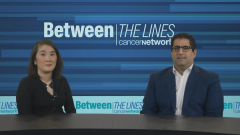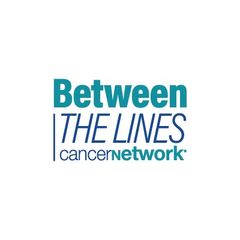
CHRYSALIS: Amivantamab in Patients with Advanced NSCLC
Expert oncologists review the CHRYSALIS trial, which resulted in the approval of amivantamab in the second line for patients with locally advanced or metastatic NSCLC with exon 20 mutations.
Episodes in this series

Transcript:
Joshua K. Sabari, MD: Let’s jump into the data for the CHRYSALIS study. This was a dose-escalation phase 1 study for amivantamab, which is an EGFR and c-MET bispecific antibody. We looked at a specific cohort, cohort D, of patients with EGFR exon 20 insertion mutations. In this cohort, we enrolled 114 patients, and all patients are treated at the recommended phase 2 dose, either 1050 mg for patients weighing less than 80 kg, or for those weighing more than 80 kg, 1400 mg. Tell us about those data and how that led to the FDA approval in this setting.
Helena A. Yu, MD: I think this was a pivotal practice-changing study. This was the first big approval in EGFR exon 20. That study showed a response rate of 40%, and I believe a PFS [progression-free survival] of 8.3 months. You can correct me if I’m wrong.
Joshua K. Sabari, MD: That’s exactly right.
Helena A. Yu, MD: I think it’s been a great thing for our patients, and because there was no targeted therapy option, it got approval on that single-agent data.
Joshua K. Sabari, MD: I was part of that study in the development, and it was an exciting time to see patients responding to a mutation where we weren’t having great success with a lot of our other therapies. Now, this is a drug when given in the clinic as an infusion, it has some nuances to it. Walk me through that a bit. How is it dosed, how do you think about the initial strategy, and how do you educate your patients on treatment with this therapy?
Helena A. Yu, MD: That’s a great question too. I think education is key, education of our patients and of our chemotherapy infusion staff, so they know what to expect. The one maybe unusual adverse effect with amivantamab is the infusion-related reactions. I have seen them primarily, almost exclusively, on day 1, and because of that, the first dose is split, where you get part of the dose on day 1 and part on day 2.
I always instruct my patients, I say, “If you feel anything is off, if you feel like you’re having some wheezing, you’re having some flushing, you’re having pain anywhere, please let us know as soon as possible” I’ll counsel the chemotherapy staff as well. As long as the medication is stopped promptly, and medications are given if appropriate to address the reaction, I, to date after treating quite a few patients, have had all patients successfully go to day 2. What about you?
Joshua K. Sabari, MD: Same here. This is a drug for which you need to educate your patients, and your staff. An infusion-related reaction, as you mentioned, is quite common, 65% to 70% of my patients have one on cycle 1, day 1. But when they have a reaction, most of the time it’s just flushing, 30 or 35 minutes into the infusion, we stop the medicine. I don’t usually continue it that day. I have patients come back for cycle 1, day 2, to get the remainder of the infusion. The infusion-related reaction for me in my clinic is less than 1% on the second day, and thereafter very well tolerated over time in patients. We saw the data from cohort D on the CHRYSALIS trial. It had an impressive, as you mentioned, 40% response rate. We’re dealing with the infusion reaction in the clinic, and most patients are able to continue therapy and benefit from therapy over time. Now, how does this regimen compare to some other regimens approved in this setting?
Helena A. Yu, MD: I would say that to me, it is my EGFR exon 20 inhibitor treatment of choice just because there isn’t anything that has a superior response rate or duration of response. I think there are anecdotally people who use some of the EGFR inhibitors that are approved for sensitizing mutations. I don’t do that. We talked about osimertinib, certainly at an 80-mg standard dose, afatinib, those drugs, I have not seen efficacy in patients with EGFR exon 20 mutations.
Transcript edited for clarity.
Newsletter
Stay up to date on recent advances in the multidisciplinary approach to cancer.






































